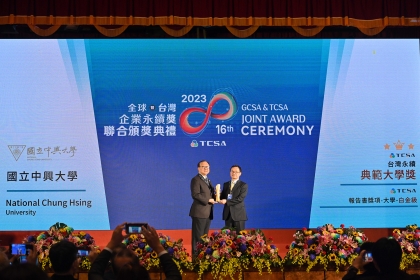NCHU Wins 2 Highest Awards in the 16th Taiwan Corporate Sustainability Awards (TCSA)
2023-11-16
興新聞張貼者
Unit秘書室
1,556
NCHU began publishing its sustainability report in 2021, and has participated in the Taiwan Corporate Sustainability Awards (TCSA) for three consecutive years. NCHU won the two highest awards in the 16th TCSA this year (2023) - University Sustainability Report Award - Platinum Award and Taiwanese Sustainable Model University Award. Former Secretary General Chin-Shien Lin received the awards on behalf of NCHU.
NCHU currently has 12 colleges, namely the College of Liberal Arts, College of Agriculture and Natural Resources, College of Science, College of Engineering, College of Life Sciences, College of Veterinary Medicine, College of Management, College of Law and Politics, College of Electrical Engineering and Computer Science, College of Medicine, Academy of Circular Economy, and International College of Innovation and Industry Liaison, with complete departments and institutes to cultivate students' professional skills and knowledge, reflection and innovation, teamwork, local care, and global thinking.
Global sustainable development emphasizes that the economic development process must give consideration to social inclusion and environmental sustainability. NCHU has utilized its expertise to engage in cutting-edge technological developments and guide sustainability. In terms of social participation, NCHU has dedicated efforts to information security, large disaster survey, plant diagnosis, cold chain technology, animal care, healthcare in rural areas, and international services. With regard to environmental governance, NCHU actively dedicates efforts to net zero emissions, greenhouse gas, energy efficient equipment, and renewable energy.
The sustainability report of NCHU is disclosed on the USR information platform - sustainability report section (https://usr.nchu.edu.tw/sustainability), and may be referenced by domestic and overseas stakeholders and those who are concerned. The report records the university's major governance, social participation, and environmental governance results, and response to the 17 Sustainable Development Goals (SDGs) of the United Nations. It also discloses related efforts and results in hopes that the power of education will allow SDGs to strike root and truly achieve sustainability.
NCHU currently has 12 colleges, namely the College of Liberal Arts, College of Agriculture and Natural Resources, College of Science, College of Engineering, College of Life Sciences, College of Veterinary Medicine, College of Management, College of Law and Politics, College of Electrical Engineering and Computer Science, College of Medicine, Academy of Circular Economy, and International College of Innovation and Industry Liaison, with complete departments and institutes to cultivate students' professional skills and knowledge, reflection and innovation, teamwork, local care, and global thinking.
Global sustainable development emphasizes that the economic development process must give consideration to social inclusion and environmental sustainability. NCHU has utilized its expertise to engage in cutting-edge technological developments and guide sustainability. In terms of social participation, NCHU has dedicated efforts to information security, large disaster survey, plant diagnosis, cold chain technology, animal care, healthcare in rural areas, and international services. With regard to environmental governance, NCHU actively dedicates efforts to net zero emissions, greenhouse gas, energy efficient equipment, and renewable energy.
The sustainability report of NCHU is disclosed on the USR information platform - sustainability report section (https://usr.nchu.edu.tw/sustainability), and may be referenced by domestic and overseas stakeholders and those who are concerned. The report records the university's major governance, social participation, and environmental governance results, and response to the 17 Sustainable Development Goals (SDGs) of the United Nations. It also discloses related efforts and results in hopes that the power of education will allow SDGs to strike root and truly achieve sustainability.



